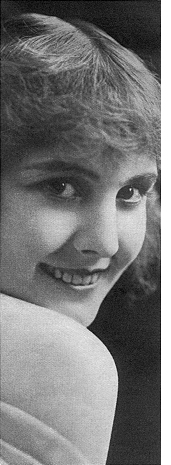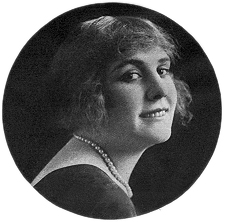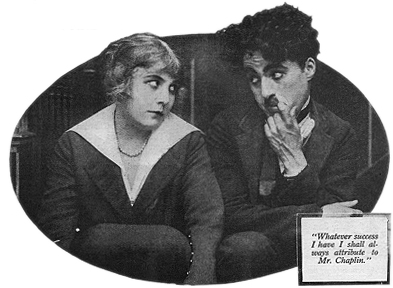
An archive of articles on the silent era of world cinema.
Copyright © 1999-2025 by Carl Bennett and the Silent Era Company.
All Rights Reserved.
|
|
The Star Soubrette
OF THE MOVIES: EDNA PURVIANCE, LOVELY FOIL
OF CHAPLIN, A SUDDEN DISCOVERY, ALWAYS
A LEADING WOMAN, AND TWENTY YEARS OLD.
By John H. Blackwood
 When I told Edna Purviance that she was to be magazined as The Star Soubrette of the Movies she pouted just a bit. You see, ever since she first faced a camera, a matter of some eight months ago — Miss Purviance has always played leading roles with Charlie Chaplin. Hence the distinct shock to be told that she must be a soubrette for magazine purposes, if for no other reason. When I told Edna Purviance that she was to be magazined as The Star Soubrette of the Movies she pouted just a bit. You see, ever since she first faced a camera, a matter of some eight months ago — Miss Purviance has always played leading roles with Charlie Chaplin. Hence the distinct shock to be told that she must be a soubrette for magazine purposes, if for no other reason.
But this pretty little pout — it really was so infinitesmal and so delightfully dimpled that it deserves to be called a poutette, rather than a good old fashion pout — quickly dissolved into one of those luscious Purviance smiles — one of those I-Use-No-Other-Dentifrice smiles — and we then were on a friendly and working basis.
The first thing that impressed me during a half hour talk with this Chaplin co-worker was that she is an unusually serious minded young woman. I had supposed that being a Chaplinette she must of course be one of those frolicsome creatures, fluffy-minded and blonde as to inclination as well as to hair. And then she completely upset all of my preconceived ideas of what a Star Soubrette ought to be by telling me that she didn’t care a tinker’s cuss word for rag time music; that she vastly preferred a Chopin nocturne or a Liszt rhapsody to an Irving Berlin rag number.
Then as if that wasn’t good and sufficient, she went on and discussed authors like a school ma’am from Boston — told me that her favorite writers were Shelly, Keats, Scott and Burns — that she thought “Vanity Fair” the greatest story she ever had read and that she wondered who would be the Macaulay or Gibbon to record this War of the Worlds.
Another distinct shock that Miss Purviance gave me, and which entitles her to a place entirely removed from almost every other person in the movies, is her own dissatisfaction with the work she already has done. She believes — and she impresses you with this belief, too — that there is a lot of better work ahead of her, that she is going to reach out for it, and that she is going to accomplish it if determination and ability and hard work count for anything.
Then, just when Edna Purviance had made me believe that she was an uncanny sort of a young woman, an eerie feminine creature because of this expressed dissatisfaction with her own efforts, she landed back on earth with a thump, and made me realize that she was only a regular old fashioned human being, after all, because she told me that really, she didn’t care so very much for comedy. Said she wanted to have a chance to do some serious work before the camera. Knew she could do it. Used to sit about the house for hours and do nothing but think. Yes, when the other children in the neighborhood were out having a good time!
The story of the tragedian whocraved a chance at comedy and the fun-maker who thought he could make ’em cry — and who frequently did, with his comedy, — all came back to me as I listened to this clever comedienne wishing for an opportunity to emote.
It was all there, that eternal recital of unrest over one’s successes.
The world in general and lovers of the Chaplin comedies in particular don’t know how near they came to having to get along without a screen distribution of the fascinating Purviance features.
The Star Soubrette had just been graduated from a San Francisco business college — this was a year ago last March — and she and a number of other embyronic stenographers and book-keepers thought it would be great fun to take an automobile trip across the bay, to Oakland. On the way back the Purviance machine demolished another car and Purviance.
The girl spent the next three months in a hospital. There was a dislocated shoulder. . . . the medicine men counted three separate dislocations . . . a lot of scratches, bruises, bumps, breaks, contusions and some other things.
And when la Purviance emerged she was more radiantly beautiful and lusciously lovely than ever!
Shudder, you people who have admired Edna Purviance in Chaplinitis, as youthink of what you’d have missed if Miss Purviance has gone direct from that business college into an office and spent her sweet young life writing “I-Have-Your-Letter-of-the-Umpth-Instant-and-in-Reply-Would-Say” stuff.
 A calamity? A calamity?
No — a catastrophe!
When Charles the Great went to Essanay it was admitted by everybody concerned that his first picture simply had to be great.
This first picture was called “A Night Out.” It needed — and must have — a leading actress of the dazzling type.
The picture was held up. Work was out of the question. Chaplin was doomed. The I-Told-You-Sos could be seen, bricks and venerable fruit in hand, all ready to let loose.
Then stepped forward a young assistant director with the remark that he knew where to find the very young woman they needed.
Four hours later, Edna Purviance was standing in front of a camera at the Niles studio, and little King Charlie was giving her her first direction as a film actress.
She was a leading lady and she has been a leading lady ever since.
For purely Who’s Who purposes, it is worth mentioning that Edna Purviance was born in Nevada, at a place called Paradise Valley. Her father, mother and an elder sister still hold Nevada in sufficient regard to continue to live there, only now they have moved over to another spot that Rand & McNally almost overlooked, a place known to the neighborhood as Lovelock. Miss Purviance has another sister — Edna is the “kid” of the family — living in San Francisco.
There never was the slightest bit of parental objection to Edna working in the movies. She just went, and now Mother and Father are mightily pleased at the success that has come to their youngest daughter. Any father or mother would be, and besides, Edna told me so.
Thus far, Edna Purviance has been seen with Charlie Chaplin in these pictures: “A Night Out,” “In the Park,” “A Jitney Elopement,” “The Champion,” “The Tramp,” “By the Sea,” “Work,” “The Bank,” “The Woman,” and “Shanghaied.”
Miss Purviance regrets that thus far in her career she has never had a chance to wear modish gowns and says that she won’t be actually happy until such an opportunity comes to her. Says she doesn’t care if it does rip a hole in a week’s salary; she simply wants to show her admirers all over the country what she looks like when unholstered in one of those Parisian affairs.
That Miss Purviance is deeply appreciative of Chaplin’s assistance is quickly made apparent.
 “Perhaps I shall never be a great success.” . . . Oh, Edna, and here you are a whopping big success, after only eight months’ work in the picture business. . . . “but whatever success that I may have I shall always attribute to Mr. Chaplin.” Otherwheres than in this impressive moment he had been just “Charlie.” “Perhaps I shall never be a great success.” . . . Oh, Edna, and here you are a whopping big success, after only eight months’ work in the picture business. . . . “but whatever success that I may have I shall always attribute to Mr. Chaplin.” Otherwheres than in this impressive moment he had been just “Charlie.”
Thus she gets warmed up and goes on with never a cylinder missing:
“It was Charlie who gave me my first chance. It was he who directed me over the rough spots, who always was patient and painstaking with me, who coached me, who encouraged me and without whose help I never could have accomplished what I have.”
I mentioned at the very outset that Edna Purviance was a modest, serious sort of girl. Now, you can add for yourselves, that she possesses that rare, rare quality of gratitude. For the benefit of the thousands let me say that she is not married, and will not for some years yet, she says, even think of getting married!
Edna Purviance, queen of shadow farce, was twenty years old October 21, 1915. This article originally appeared in Photoplay Magazine, December 1915, Volume IX, Number 1, pages 42-44.
|




































